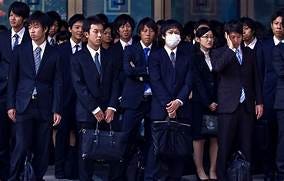In the Name of Tradition
We’re not here some nōryoku shugi (meritocracy) like America. This is Japan. We value seniority above all
muttered the elderly human resources clerk and gave me one last dismissive look before heading out the door, clearly annoyed by my insistence.
For the past 30 minutes, I had been trying to convince him to revise the salary offer we were about to send to a foreign applicant for a position within our department. The candidate held an advanced degree from a prestigious American university, was perfectly fluent in Japanese (as well as two other languages besides English) and had several years of experience in corporate and education entities in Japan and the United States. However, being under 45, the system was forcing us to offer him a comparatively small salary, one that while aligned with his position and experience by the standards of Japanese state institutions, was clearly far from what he could have obtained in any other organization in the US or in private entities in Japan. Moreover, in accordance with Japanese rules for state institutions (that had been also recited to me as soon as I decided to join the organization), the person was not entitled to various perks and benefits otherwise the norm in other places. On business trips abroad, for instance, he was expected to pay for his own travel insurance, cover local transportation expenses, as well as business meals with foreign partners and so on.
I conveyed to the candidate the conditions we could offer also informing him that the salary is non-negotiable (having been calculated by a mysterious algorithm only some human resources guru was privy to), that he was not entitled to zangyō (overtime) payment and any other bonuses, as well as a number of other equally strange and embarrassing conditions. In exchange, we were "ennobling" him by allowing him to become a member of our prestigious state institution. I assume that there is no doubt in anyone’s mind that the person thanked us kindly and moved on to a different position where he could actually feel like he was gaining something by becoming an employee. The whole episode left a bitter taste in my mouth and, after receiving his response to our offer, I could only mutter on my turn: Mottai nai (Such a pity!). Unable to jump over the shadow of a compensation and benefits tradition clearly anachronistic, we had missed out on a great opportunity. It looked, however, like I was the only one feeling that way.
I don’t know how common this situation is in Japanese state and governmental organizations trying to recruit talent from abroad—and there will be more and more such organizations, given Prime-Minister Shinzō Abe’s push for globalization—but I believe that the extremely small number of foreign employees in such organizations is an indication of the rather limited appeal that excessively restrictive employment conditions have on applicants from abroad. So, what are some of the obstacles impeding the creation of proper hiring conditions for foreigners?
Probably the most suffocating is the idea of holding on to traditions that made sense during the time when employees (mostly domestic, and very, very rarely international) were hired by Japanese companies for life and were literally “growing” with the company thus reaping the benefits of seniority. That is clearly not the case anymore. Private corporations as well as state organizations in Japan no longer really hire for life. Moreover, the need to constantly bring in new international employees at all career levels is one that should compel organizations all over Japan to find the most attractive compensation packages for those employees. However, instead of adapting to the global talent competition they must join in order to survive, Japanese organizations hold on to the idea that they are doing a favor to foreign employees by allowing them to join their ranks, instead of understanding that it is, in most cases, quite the opposite: they are the beneficiaries of the experience and talent of the foreign employees they hire. The old ie (clan)-centered mentality according to which when being employed by a company one becomes part of that "company clan" may still hold some fascination for Japanese employees, but it is meaningless to most foreigners. If that mentality does not change fast, Japan may fall even further behind in the global competition. That is not to say that tradition must be eliminated at all cost. Tradition has its place, but holding on to something because “We’ve always done it this way” is, as Rear Admiral Grace Hopper used to say, “the most dangerous phrase in the language,” and one that prevents growth and creativity.
One other issue that will take even longer to change than said mentality itself is the fact that most administrative staff making decisions on the salary, benefits and work conditions of foreign employees expected to move to Japan from abroad, not only do not speak any foreign language, but have never studied, worked or lived abroad themselves. So, unfortunately, there is no possible way for them to truly comprehend what it means to accept a position in a different country (even in one that you are very familiar with and whose language you speak with ease), move your family there and establish a new life from scratch, without that support system that most people take for granted in their own country: family, friends, customs, culture, and even where to find the best deals on food and clothing. To these people, a set salary should be enough for the foreign employee since it is enough for themselves, not having certain benefits or paying out of pocket for transportation while on a business trip abroad is atarimae (a given), and the fact that things are done differently elsewhere holds no meaning. These employees’ lack of worldliness and opacity—none of which is their fault—makes for a bumpy road ahead in Japan’s path to true globalization.



